- Home
- Nicholas Sparks
Three Weeks With My Brother Page 6
Three Weeks With My Brother Read online
Page 6
“I know,” I said. “I’m sure I’ll be ignoring the credit card bills for months.”
“More like years,” she said. “Or even decades.”
We kissed one last time. During my flight, all I could do was think about her, and how lucky I was to have married her. Visions of the trip never entered my mind at all.
A couple of hours later, I arrived in Fort Lauderdale under sunny skies, retrieved my luggage, and waited for my brother in the baggage section of the airport. I called Cat to tell her I made it, then took a seat on one of the benches, waiting for him.
A half hour later, Micah wasn’t hard to spot walking through the airport. Tall and blond, he had a tendency to stand out in a crowd. As soon as he spotted me from across the baggage terminal, he thrust his arms above his head. I knew what was coming and cringed.
“NICKY, MY BROTHER! I HAVE FINALLY ARRIVED AND THE FESTIVITIES CAN BEGIN!”
His voice boomed in the terminal. Strangers gawked and turned to me in shock. I felt their eyes focusing on me.
“Obviously my brother doesn’t get out much,” I murmured.
A few moments later, amid a crowd that had suddenly given us plenty of room, we were hugging.
“You seem to be feeling pretty good, Micah.”
“Had a couple of cocktails on the plane,” he said easily. “Getting in the proper mood.”
As soon as we separated, his eyes seemed to light up even more.
“Can you believe we’re really going?” he asked. “In two days, our adventure begins.” He put his hand on my shoulder. “You getting excited yet?”
“Of course.”
“No you’re not. This”—he said, motioning to himself—“is what excited looks like. You don’t look excited.”
“I’m excited on the inside.”
He rolled his eyes. “How was your flight?”
“Good. And yours?”
“It was great. Sat next to a couple of neat people. I told them all about the trip. They couldn’t believe it. Have you called Cat to tell her you made it?”
I nodded. “Yeah, we just talked a few minutes ago. Do you want to call Christine?”
“I will in a little while. I need to unwind first. Stretch my legs for a while. Gotta stay in shape, you know. I’m gonna do quite a bit of hiking over the next few weeks.”
“You are?”
“Didn’t I tell you?” His voice began to rise as he went on. “I’m going AROUND THE WORLD WITH MY BROTHER!”
The crowd parted even more, some of them looking frightened now.
“Hey, you hungry?” he suddenly asked.
“A little.”
“Well, I’m starved. You want to get something to eat after we drop our luggage off at the hotel?”
“You got it.”
The luggage carousel finally lurched to life, and I was busy scanning the assorted suitcases for his luggage when suddenly he pointed.
“There it is. The red one.”
It was undoubtedly the largest suitcase I’d ever seen, absolutely massive. At least twice the size of mine, it was straining at the seams and bulging in the middle. Micah needed both hands and a couple of grunts to retrieve it. When he set it upright, so that it could be wheeled, it seemed to spread even wider.
“Okay, I’m ready,” he said, satisfied. “Let’s go.”
“Are you sure you brought enough?”
“Got everything I need.”
I stared at the suitcase. “It looks like you packed a small farm animal in there.”
“One thing I’ve learned is that you can never bring too much stuff when you’re traveling.”
“I always thought the opposite was true.”
He winked. “No, that’s just a myth put out by the airlines. Don’t believe it. And when you run out of things on the trip, don’t worry—I’ll be happy to share.”
We found a restaurant in downtown Fort Lauderdale where we ate outside and watched people wander in and out of bars up and down the street.
We bantered back and forth until finally Micah paused. Leaning back in his chair, he squinted at me.
“You’re still not into this, are you? What we’re doing, I mean?”
“I’m getting there.”
“Did you ever think you might be depressed?”
“I’m not depressed. Just busy.”
“It runs in our family, you know. Some of our relatives are depressed.”
“I’m not depressed.”
“They have medication now. It might do you some good.”
“I don’t need medication.”
“Denial is an ugly thing, Nicky.”
“I’m not in denial.”
“See what I mean? That’s denial.”
“You’re a pain, you know that?”
“Yeah. That’s what Christine says.”
“She’s a smart lady.”
“That she is. But she’s not here, and right now, we’re talking about you. So why are you depressed, little brother? You’re definitely not excited about this, and we’re on the verge of leaving. Talk to me. I’ll be your shrink.”
“I’m not depressed,” I said again. “Like I said, I’m swamped. You have no idea how busy I’ve been. It’s just . . . not the right time for something like this.”
“That’s not true,” he said, shaking his head. “You’re choosing to let life control you, instead of the other way around. That’s the big secret. You choose the kind of life you want to live.”
“You always say that.”
“Only because it’s true. Using you as an example—you’re busy because you’re behind on all your deadlines and want to catch up, right?”
“Exactly.”
“But what if you missed your deadline? It’s not as if you’re going to get fired, are you?”
“No, but—”
“But you think bad things will happen if you do,” he finished for me. “So, in other words, you’re making a choice. And if it’s your choice, then accept it, but don’t let it control you. In the same way, you can choose to be excited about the trip. That’s entirely up to you.”
I looked away, shaking my head. “It’s not always that easy,” I said slowly. “You don’t choose everything. Sometimes life throws you curveballs.”
“You don’t think I know that?” he said softly. “Look, just so you know, this trip is going to be great. You just wait. After all this is over, you’ll look back and be glad you came. And then you’ll thank me for bringing you along.”
“I invited you to come, remember?”
“Oh, yeah. You’re right.” He shrugged. “Well, in that case, be a good host, and stop ruining my buzz.” He turned to get the waitress’s attention. “This man needs a cocktail.”
Despite myself, I laughed.
Maybe it was my brother’s pep talk, or maybe it was the cocktail, but whatever the reason I gradually warmed to the idea of going. Whether I had time to go was now irrelevant, after all, and my brother’s good mood was infectious. My brother has always had this effect on me. With his confidence and easygoing manner, he has always been a hit at parties, and he’d been the best man in six different weddings. Six.
The next day, we went by the reception room TCS had arranged to check in for the trip. We signed in, gave them our passports, and got our luggage tags. Each was large, pink, and numbered, so that the TCS crew could easily make sure every bag was accounted for. One of the nice things about the trip, we would later learn, is that TCS handled all the luggage. Our only responsibility would be to have the luggage outside our hotel room at the appointed time.
We spent the afternoon relaxing by the pool, and later that evening we attended an introductory cocktail party and dinner. It was our first chance to meet our fellow travelers.
There would be eighty-six of us on the trip, most of whom were considerably older than Micah or I. We began the gradual process of getting to know our traveling companions.
We mingled and chatted with a few people, and eventu
ally made our way to the ballroom, where tables had been set up. As we ate, we were introduced to the TCS staff; quite a few would be traveling with us, to make sure everything went smoothly. We were introduced to guest lecturers and Jill Hannah, the physician who would attend to any medical issues that might arise.
Only a couple of years older than we were, she smiled easily, and would end up becoming one of our closest friends on the trip. Auspiciously, she was seated at our table.
“Any words of advice?” I asked her.
“Don’t eat the vegetables or salads, no matter how nice the hotel is.”
“Because of the fertilizers or soil?”
“No,” she said. “Because they wash them in the local water, and you never know whether it’s been purified.”
“Anything else?”
“Don’t use the tap when you brush your teeth either. Take these precautions, and you’ll probably be fine. I’m going to say the same thing to the rest of the group later, when it’s my turn to talk. But just wait—half these people won’t listen, and they’ll end up sick. You don’t want to be sick when you travel like this. Trust me. It’s no fun.”
As she spoke, I could see her eyes darting from me to Micah and back to me again.
“You guys are brothers, right?”
We nodded.
“Twins?”
We get that quite a bit, actually. I shook my head.
“No.”
“But you’re older, right?”
“No, he is.” I grimaced.
Micah leaned in, looking inordinately pleased by her comment. Micah enjoyed the fact that nearly everyone thought he was younger than I when they saw us together.
“I’ve always told him he should take better care of himself,” he chided.
She smiled. “Are you guys married?”
“We both are,” I answered.
“Why did you come together, and not with your wives?”
We explained about our children and showed her pictures of our families. Finally, she looked up at us again.
“I think it’s great that you two are doing this together. Siblings aren’t always as close as they should be. Were you always this close?”
I hesitated.
“Not always,” I finally admitted.
In 1973, halfway through the school year, we moved to Grand Island, Nebraska. Or rather, everyone in the family except my dad moved. At the time, my mom told us that we were leaving so that my dad would be able to finish his dissertation, and we moved into a small duplex just around the corner from my mom’s parents’ house. While my dad did indeed finish his dissertation that year, he and my mother had in fact separated. It was years, however, before we ever learned the truth about this. My mom was not above keeping secrets from us if she thought the truth would hurt us.
Grand Island was a sleepy little town, nestled in the middle of the state, and as different from Los Angeles as a place could be. Wide yards separated the homes, and directly across the street from my grandparents was the elementary school we’d attend. Unlike the schools we’d been attending, Gates Elementary had massive grass fields, baseball diamonds, and—on the far side, just off the school property—a set of train tracks, where trains would come by regularly.
It didn’t take long before my brother and I were laying pennies and nickels on the tracks, waiting for the train to crush and flatten them, but unlike Los Angeles, there wasn’t much else to do in the way of exploring or getting in trouble. There weren’t any vacant, burned-out buildings in which we could build forts, there were no bridges to climb, and though there were ravens, none of them ever attacked us. As she had in Los Angeles, my mom got a job—this time as an optometrist’s assistant—and after school, we’d head to my grandparents’. There, my grandmother would make us chocolate malts and cinnamon toast (the most exquisite afternoon snack in the world) and we’d either play in the yard or go down to the basement, where my uncle Joe kept his collection of model airplanes. There were probably over a hundred models, including Spitfires and Japanese Zeros, and my uncle had assembled them as if they would someday hang in a museum. They were painted in exacting, excruciating detail, and though we weren’t allowed to touch them, we spent hours looking at them.
Entering a new school halfway through the year is always hard, and for the first couple of weeks my brother and I spent most afternoons together, as we had in Los Angeles. We discovered the parks and rode our bikes there; more often than not, we’d see dozens of other kids playing games, some of whom were in our classes. A month later, they would all be there again, sledding down the hills.
But by that age, the differences between us were becoming apparent. Micah was taller, stronger, and more athletic than I, and seemed to fear nothing. He viewed the move as a new adventure, made friends easily, and carried himself with a confidence that I found elusive. I had always been less secure than he. And I worried constantly. I worried about getting in trouble, I worried about getting good grades, and I worried what other people thought about me. I worried about doing the right thing, and playing with the right kind of kids. Though I did indeed make new friends, it took far longer for me to adjust to my new surroundings.
As spring overtook winter, Micah seemed to have less and less need for my companionship, and when I tried to tag along with him, he began treating me as a nuisance. Instead, Micah would pal around with Kurt Grimminger, a boy in his class whose family owned a farm just outside town. He would go there almost every afternoon, and they would spend hours wrestling in the corn silo, riding tractors and horses, and harassing the pigs and cows with BB guns. At home, Micah would regale us with one exciting story after the next over dinner. I couldn’t help feeling envious, for no matter what I had done during the day, nothing ever seemed to be as exciting as what he was doing.
Around that time, we had our first fight. I can’t remember what we’d been arguing about, but one thing led to the next, and fists were flying. He punched me in the stomach, knocking the wind out of me, and slammed me to the ground. Soon, he was on top of me and hitting me over and over. I was helpless to defend myself, absorbing blow after blow. The next thing I remember is the sound of my mother screaming. Jerking Micah up, she swatted him before sending him to his room. He skulked off, and as I struggled to my feet, my mom reached for my arm.
“What happened?”
“He hates me!” I cried.
Even then, I didn’t know whether my pain or humiliation was worse, and when my mom tried to comfort me, I shook her hand from my arm.
“Leave me alone!” Turning away, I began to run.
I didn’t know where I was going, all I knew was that I didn’t want to talk to anyone. I didn’t want to see anyone. I didn’t want to be small, I didn’t want to live in Nebraska, and I didn’t want anyone’s pity. All I wanted was for things to be the way they used to be, and I kept going and going, as if somehow hoping to make time move in reverse.
Later, I found myself at the railroad tracks, some distance from home. I sat beneath a tree, watching for the train. The trains were always on schedule, and I knew that another train would follow an hour after the next. I told myself that I would stay until both of them went by. But when they did, I barely noticed them. Instead I sat with my face in my hands, shoulders quaking, wishing that our fight had never happened, and crying as I’d never cried before.
I could feel my family’s eyes on me when I finally walked in the door. By then it was dark, and everyone was seated at the table, but my mom seemed to understand that I wasn’t hungry, and she simply nodded when I asked if it was okay if I could go to my room. Or rather, our room. Again, the three of us were sharing a room, and in the darkness I lay down on my bed and stared at the ceiling.
While my anger had subsided, I was confused. I told myself that I wanted to be alone, that it was better for me to handle my feelings in my own way, yet I couldn’t shake the desire I had for my mother to come into the room. Like most children, I believed that attention somehow equaled lov
e, and of the three children I got less of the former, implying less of the latter. Micah, after all, had always been treated like an adult and because he was the first to experience everything from walking to talking to getting into trouble, he received the attention granted to those who occupy the head of the line. My sister on the other hand—both the youngest and the only girl—was accorded almost double privileges. She spent more time with my mom than either my brother or I, had fewer chores, seldom got in trouble, and was the only one of us who got more than one pair of shoes at a time, the reason being, “She’s a girl.”
More often than not, I was beginning to feel left out.
The knock didn’t come for an hour, and by then, I was feeling downright sorry for myself.
“Come in,” I said, and sitting up in bed, I wondered what my mom was going to say. When the door opened, however, it wasn’t my mom who entered the room. Instead, it was Dana.
“Hi,” she said.
“Oh, hey,” I said, glancing over her shoulder. “Is mom coming?”
“I don’t know. She wanted me to ask if you were hungry.”
“No,” I lied.
My sister came and sat on the bed. With long sandy-blond hair parted in the middle, pale skin and freckles, she looked like Jan Brady on early episodes of The Brady Bunch.
“Does your stomach hurt?”
“No.”
“Are you still mad at Micah?”
“No. I don’t even care about him anymore.”
“Oh.”
“I mean, he doesn’t care about me, right?”
“Right.”
“And neither does mom.”
“She does, too. Mom loves you.”
“Did she worry about me while I was gone?”
“No. She knew you were fine. But she does love you.”
My shoulders slumped. “No one loves me.”
“I love you.”
Though my sister sounded utterly sincere, I wasn’t in any mood to hear it.
“Gee, thanks.”
“That’s not why I came in here, though. To tell you that, I mean.”
“I said I wasn’t hungry.”
“I didn’t come to tell you that, either.”
“Why did you come in then?”

 The Notebook
The Notebook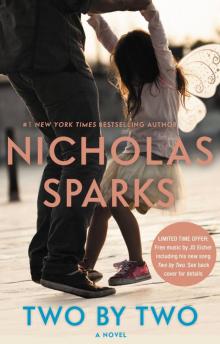 Two by Two
Two by Two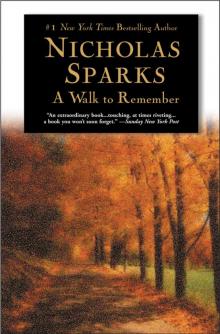 A Walk to Remember
A Walk to Remember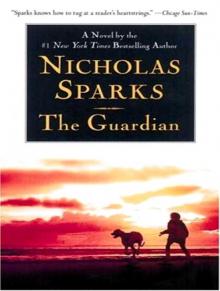 The Guardian
The Guardian Dear John
Dear John The Last Song
The Last Song The Lucky One
The Lucky One The Wedding
The Wedding The Longest Ride
The Longest Ride Safe Haven
Safe Haven The Rescue
The Rescue The Wish
The Wish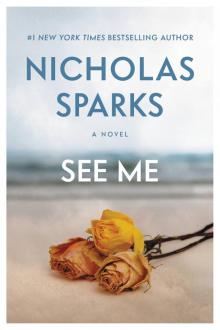 See Me
See Me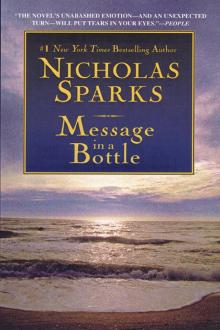 Message in a Bottle
Message in a Bottle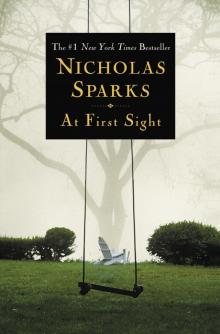 At First Sight
At First Sight True Believer
True Believer The Return
The Return A Bend in the Road
A Bend in the Road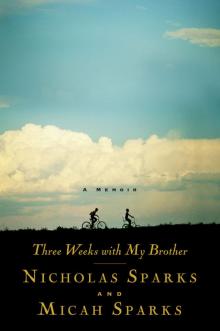 Three Weeks With My Brother
Three Weeks With My Brother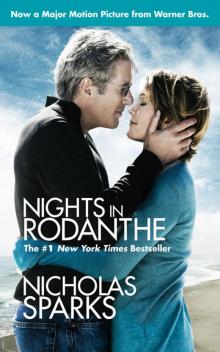 Nights in Rodanthe
Nights in Rodanthe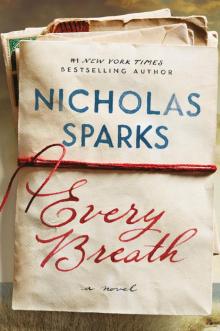 Every Breath
Every Breath